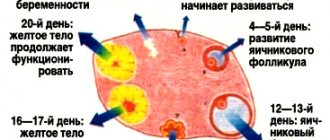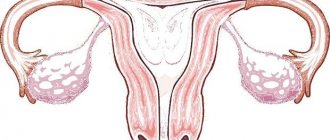Before the onset of menstruation, women’s libido increases; not only the ladies themselves, but also their partners know about this. It has not yet been possible to determine the cause of this phenomenon. Quite a large number of studies have been conducted to determine the reason for the increase or decrease in sexual desire in women and why its strength changes in different periods. In the end, doctors came to the general conclusion that the female body is affected by changes in hormonal levels. Let us consider in detail why libido increases before menstruation in women.
Hormonal influence
Why does the desire to have sex appear during menstruation? Sexual contact stimulates the production of endorphins in the brain, these are “hormones of happiness”, the effect of which is similar to opium intoxication. An increase in libido is associated with the body's desire to get rid of stress and discomfort associated with the onset of menstruation. As a result, after sex, pain in the lower abdomen decreases, mood and general well-being improve, depression and irritability disappear.
During orgasm, the hormone oxytocin is secreted, causing contractions of the smooth muscles of the uterus. The woman gets more pleasure than on other days, the feeling of anxiety decreases, and trust in her partner appears. Sex also stimulates and accelerates the cleansing of the uterine cavity. The endometrium renews itself faster; immediately after intercourse, bleeding may increase and clots may appear, but later the discharge decreases and the menstrual days end earlier.
The main reason why you want sex before your period is the increase in the level of male hormones in a woman’s blood.
Starting from the second phase of the menstrual cycle, the production of estrogen decreases, and the concentration of testosterone becomes higher. This hormone increases libido, reduces pain, alleviates PMS symptoms, and is responsible for physical activity and endurance. An increased desire to have sex usually occurs a week or a few days before the start of your period.
Women with painless periods may want sex during menstruation. If the appearance of bloody discharge is accompanied by severe pain (dysmenorrhea), then there can be no talk of sex. Intimacy can further worsen a woman’s well-being and cause severe uterine cramps.
Desire on the eve of menstruation
Sexual desire before menstruation is explained by an increase in the concentration of progesterone and testosterone. Progesterone has a greater effect in the middle of the cycle when ovulation occurs. If fertilization of the egg does not occur after ovulation, the concentration of progesterone drops, but the hormone is still present in the blood until the end of the cycle.
The male sex hormone, testosterone, has a greater influence on libido. It begins to be produced at the end of the cycle. In combination with progesterone, testosterone increases attraction to a sexual partner on the eve of menstruation.
Safe sex
Why do you want sex during your period? Is it possible to get pregnant during this period? One of the most common reasons for increased sexual desire is the realization that sex will not lead to an unwanted pregnancy, and it is possible not to use contraception. The woman and man relax as much as possible, and all attention is focused on internal sensations.
But there are risks of conceiving a child even during menstruation. This is due to the individual characteristics of the body, late or repeated ovulation. Therefore, you should not neglect contraceptives. It is best to use a condom, this will reduce the risk of infection of the uterus and protect against unplanned pregnancy.
A woman can be sure of safe days by keeping a diary, which records a graph of changes in basal body temperature throughout the entire menstrual cycle. This way you can track when ovulation occurred and which days are safe. You are least likely to get pregnant during the first 2 days of your period. Discharge during this period is the most abundant, so even if fertilization occurs, the egg cannot attach to the wall of the uterus and is washed out along with blood and dead endometrial cells.
Preventive recommendations
If you want to have sex before your period or during this period, intimacy is acceptable. But to prevent infection, you need to adhere to the following recommendations:
- It is imperative to perform hygiene procedures before and after intimacy.
- Douching should not be done.
- It is necessary to use a condom, which will solve the aesthetic problem. It will also help protect against infection and prevent unwanted pregnancy.
- Preference should be given to a position that minimizes vaginal discharge.
- You can't make love with a sanitary tampon inside.
These measures will help a woman maintain health and avoid discomfort.
Increased libido during menstruation is due to changes in the hormonal system. Each girl must decide for herself whether to follow this desire or overcome it. But during intimate intimacy, you need to follow certain rules that will help prevent negative consequences.
Blood flow to the reproductive organs
Why do you want sex during your period, what is the reason for this? During menstruation, endometrial detachment occurs in the uterus, which is accompanied by rupture of blood vessels and blood loss. The blood supply to the uterus, ovaries and appendages increases, thereby improving the innervation of the nerve endings of the reproductive organs. A woman becomes more receptive to caresses, sensations during sex intensify, orgasm becomes brighter and sharper.
The discharge actively moisturizes the vaginal walls, the mucous membranes swell slightly, which also contributes to pleasant sensations for the woman and her sexual partner.
Symptoms of menstruation
Menstrual bleeding occurs when the egg is not fertilized. The uterine lining comes off. The vessels of the organ open, bleed, and as a result, blood clots are released from the vagina. At first, menstrual bleeding is heavy, but by the end of menstruation it subsides.
Due to blood loss, a woman wants to eat a lot, as the hemoglobin concentration drops. To shed the internal mucous membrane, the uterus contracts, so the lower abdomen may hurt.
The first days of menstruation are sometimes accompanied by pain in the lumbar region, legs, and head.
In addition to these symptoms, libido may increase. A woman experiences desire in the first 2 days or the entire period of menstruation. Sometimes libido decreases due to pain or general weakness.
Disadvantages of sex during menstruation
During menstruation, the cervical canal is slightly open and through it infection can freely penetrate into the uterine cavity, endometritis can develop, and sexually transmitted diseases can occur. Blood is a convenient environment for the development of pathogenic microorganisms, so it is recommended to use a condom. This contraceptive will also protect against unwanted pregnancy, since menstruation does not provide a 100% guarantee of protection.
The woman herself can become a source of infection, since chronic diseases worsen before menstruation and immunity decreases. It is not recommended to have rough sex with deep penetration into the vagina. This can lead to injury to the cervix.
Another disadvantage is aesthetic inconvenience: bed linen can get dirty and the sight of blood can cause discomfort. This is not acceptable for all couples, so the question of whether to have sex during menstruation is decided individually.
In women with painful menstruation, sexual intercourse causes strong contractions of the uterus and increases pain and discomfort. The amount of blood loss may increase and the risk of developing endometriosis increases. In such cases, it is better to postpone intimacy until the end of the critical days and the body’s recovery.
Increased libido during menstrual bleeding
Increased desire for a sexual partner during menstruation is explained by the maintenance of progesterone and testosterone concentrations that were established in the premenstrual period. The amount of these hormones does not immediately decrease in the blood, but persists for several more days. In addition to this reason, there are other factors that increase libido.
Reasons for making love during menstrual bleeding:
- there is swelling of the vaginal mucosa, due to which the sensations become more vivid;
- Serotonin is released after lovemaking, relieving discomfort;
- The contractile activity of the uterus decreases, the duration of menstrual bleeding decreases.
Also, a woman during menstruation is not afraid of getting pregnant, which is why attraction increases.
Increased libido after menstruation
In some cases, women continue to have an increased desire to have sex even after menstruation. In the first phase of the menstrual cycle, estrogen levels begin to gradually increase, but testosterone still remains at a high level. It is this hormone that is responsible for libido. In addition, the painful sensations associated with menstruation have already passed, so a strong sexual desire appears even in the fairer sex suffering from dysmenorrhea.
Typically, this increased desire lasts 3-4 days. Then testosterone levels begin to decline and libido weakens. The next surge occurs during ovulation. The content of androgens in the blood of women differs, so not everyone has such a desire and manifests itself in different ways.
The nature of female libido
30% of women experience an increase in sexual desire before menstruation
It was possible to find out several factors influencing this process:
- menstruation has an impact because after its completion, the moment of greatest sexual desire occurs;
- temperament also changes slightly depending on menstruation and affects libido;
- hormonal imbalance leads to increased interest in the opposite sex;
- An unstable and non-trusting relationship with a sexual partner can lead to cooling in the relationship and the fading of sexual desire.
The listed reasons have a strong influence on a woman’s sexual desire. It completely depends on the monthly cycle and external influences. Doctors working in this field believe that 30% of women experience an increase in sexual desire before menstruation.
Why can't you have an orgasm before your period?
According to research results, about 17% of women have never experienced orgasm. I will discuss the causes of anorgasmia in a separate article. In this article I would like to dwell on the question of what effect the lack of orgasm has on a woman’s body.
Sex that does not end in orgasm affects all women differently. Some people tolerate this relatively easily, while others, on the contrary, experience very noticeable changes in the nervous system and well-being in general. Be that as it may, almost every woman notes a negative effect on the nervous system.
Many women feel nervous irritation, increased levels of aggressiveness, worsening mood, poor health and a depressed state of the body as a whole. Some women experience general malaise and headaches.
A prolonged absence of orgasm in a woman’s life can contribute to her development of depression, apathy, aggression, neuroses and lead to the formation of hysterical character traits.
The lack of orgasm also negatively affects women's health. Due to stagnation of blood flow in the genitals and pelvic area, women can develop fibroids, fibroids, inflammation of the ovaries, inflammatory processes in the urinary system and internal genital organs.
In women, pain increases during the menstrual cycle, its disruption may occur, uterine bleeding is possible due to weakening of blood vessels, and nervous tension also increases during the premenstrual period.
According to the results of clinical studies, the absence of orgasm can also contribute to the development of cervical cancer, although it has been established that this type of cancer is infectious and sexually transmitted.
Due to hormonal imbalances, it is also possible to develop mastopathy - inflammatory processes in the breast. Under unfavorable conditions, mastopathy can lead to the appearance of malignant neoplasms.
According to research, only about 29% of women experience orgasm regularly, and 54% do not experience it regularly.
The latter include those women who are able to experience orgasm not with every partner, or with the same one, but not every time. At the same time, about 58% of couples break up due to a lack of satisfaction with the partners’ sex life.
The share of women who decide to leave a partner who does not fully satisfy her sexual needs is slightly less than half.
Achieving harmony in the sexual sphere of a couple is possible with independent identification of the reasons.
The solution to the problem may be to search for new positions and methods of stimulation, create a favorable atmosphere conducive to intimacy, resolve conflicts in a couple, etc.
If it is not possible to detect and eliminate the causes, or the partner does not want to deal with this issue, then the couple or woman can always turn to a sexologist for help.
Types of orgasm
First, you need to keep in mind that there are two types of orgasm that are available to women:
The clitoral type is available to almost everyone, since every woman can stimulate the clitoris without outside help, for example, with the help of fingers.
As for vaginal, things are a little more complicated here. There are studies according to which about 30% of women are basically unable to experience vaginal orgasm. Many women even worry and don’t know what to do when they experience only a clitoral orgasm. But there is nothing wrong with this - judging by the statistics, this is a type of norm.
Causes
The lack of orgasm in a girl may be due to psychological or physiological reasons.
Psychological factors may include:
- Chronic fatigue.
- Depression.
- Stress.
- Disappearance of attraction to your sexual partner.
In addition, it is worth paying attention to whether the woman has strong fears associated with the fear of becoming pregnant or contracting a sexually transmitted infection. Problems in your sexual life may be caused by distrust of your partner or any conflicts in the relationship.
Lack of orgasm can also be caused by physical problems and ailments. Most often, problems can be caused by various somatic diseases. Also, most gynecological diseases can cause the disappearance of orgasm.
After surgery, the question may arise of what to do if you do not experience vaginal orgasm. This is a fairly common problem after difficult treatment or childbirth. In some cases, a girl does not experience orgasm due to problems and viruses of the genitourinary system.
A specialist can tell you what to do if you stop experiencing orgasm. In this case, it is important to determine the exact cause of the problem.
What to do if a woman does not have an orgasm, what is the reason? Hormones may suggest the answer: often hormonal changes in the body that occur due to aging or during treatment with certain medications (for example, antidepressants) lead to disturbances in sexual life and also reduce libido. Hormonal levels can be adjusted after examination under the strict guidance of a doctor. Drugs and alcohol can have a negative impact on sexuality.
Third party reasons
We should also not forget that if a girl has never experienced an orgasm, what to do may be something that her partner, rather than she, should think about. Often, the lack of orgasm is associated with the inept actions of the partner - perhaps due to a lack of sexual experience. It will be difficult for a woman to liberate herself with a man who cares exclusively about himself.
What to do if you don't have an orgasm? The first step is to make sure that you and your partner do not have dysgamy - this is the name given to sexual disharmony between two people.
Most often this happens when a man ejaculates before a woman has an orgasm.
It is difficult to say what needs to be done to experience an orgasm in such cases: usually this happens due to differences in the temperaments of the partners or the inappropriate size of the male genital organ in relation to the size and depth of the vagina of a particular woman.
Should a woman go to the doctor?
The question “why do you feel hungry before your period” will not surprise many women, because they themselves regularly experience an unreasonable feeling of hunger before the onset of their next period.
Others may shrug their shoulders in surprise, since they have never noticed such a desire in themselves as the desire to eat before the onset of menstruation. The fact is that the desire to eat extra is not a necessary sign of the imminent onset of menstruation.
This is a purely individual feature of the body’s reaction to internal changes.
It is worth recalling that a woman’s monthly cycle, menstruation and all the features of its course, depend and are regulated by hormones. Accordingly, all phenomena that arise due to the characteristics of the monthly cycle are associated with hormonal changes in a woman’s body.
Before the onset of menstruation, the amount of hormones produced by the body increases. And hormones affect the secretion of gastric juice. Its quantity increases, and accordingly, food in the stomach is digested in a shorter period of time. And the stomach requires a new batch of nutrients, food.
Accordingly, the woman feels a feeling of hunger and is tormented by a seemingly unreasonable desire to eat.
Before their period, many women crave sweets.
What is this connected with? The level of the estrogen hormone before menstruation is at a minimum, and it is this hormone that is responsible for the production of serotonin and endorphins in the female body, which are responsible for good psychological well-being and mood. So the body requires sweets, chocolate, which contain serotonin. This is how the body tries to balance the level of necessary hormones.
Other women before menstruation are drawn to foods containing a lot of carbohydrates: bread, flour products, for example.
Again, the body requires carbohydrates, in the form of starchy foods, to balance the levels of the hormone progesterone. Progesterone is responsible for calm in the body.
The level of this hormone also decreases just before menstruation and then the body “looks” for new sources of calm. Namely, starch-containing products give a similar effect.
Here every lady is free to decide for herself. If this desire can be resisted with varying degrees of success, then there is no reason for medical help. It is much worse when a woman experiences PMS “in all its glory,” causing migraines, pain in the abdomen and mammary glands, and severe swelling. During this period, you need to eat less table salt and eat foods that contain a lot of magnesium, potassium and calcium. If diets don't help, you can go to the doctor.
On the other hand, edema is unlikely to contribute to the appearance of sexual desire, but another “companion” of a woman appears during this period - itching in the vaginal area. This is what can once again provoke libido. But in reality, this is a reaction to a change in hormonal levels, and sometimes a weakening of the immune system, which can lead to a change in the composition of the microflora on the vaginal mucosa, which is why itching appears.
Weakened immunity allows microorganisms that were previously suppressed to multiply, and more abundant secretions create a nutrient medium for these microflora. If the itching is very severe, you still need to visit a gynecologist so that he can check with a smear whether thrush, also called candidiasis, has begun to develop.
When asking such a question, every lady must decide it on her own. When such a desire can be resisted, there is no reason for the doctor to help. It is much worse when PMS occurs, causing migraines, pain in the abdomen and mammary glands, along with severe swelling. During this period, you need to eat less salt, eating foods that contain a lot of magnesium, calcium and potassium. If the diet does not help, then you can go to the doctor.
Let's sum it up
As it turned out, a woman’s body is very individual. It is impossible to find a single reason for an increase or decrease in libido for everyone. That is why any woman should listen to her body. We must not forget that the desire for intimacy is completely natural, because it is this that ultimately leads to conception and subsequent procreation.
Women's libido depends on many factors. It rarely remains unchanged for a long time. Even during one menstrual cycle, sexual desire can increase or, conversely, weaken or even disappear completely.
Itching in the vagina
On the other hand, edema is unlikely to contribute to the appearance of sexual desire, but another “companion” may occur during this period, namely itching in the vaginal area. It can provoke libido once again. Weakened immunity makes it possible for those microorganisms that were previously suppressed to multiply, and abundant secretions create a nutrient medium for these microflora. When the itching is very severe, you still need to visit a gynecologist so that he can check with a smear whether the patient has developed thrush.
And the following question remains: “What should you do when a woman’s libido won’t let go, and her monthly cycle has already begun?” After all, flowing fluid through the vagina only aggravates desire, and from a medical point of view, sex is contraindicated on critical days.
Why you want to have sex before your period is now clear.
Phases of the menstrual cycle
From a medical point of view, the menstrual cycle is divided into three phases. 1. Follicular. It is officially counted from the first day of menstruation and lasts about a couple of weeks, necessary for the maturation of the follicle, from which an egg will then be released, ready for fertilization. During this period, all female hormones - estradiol, progesterone, LH, FSH - are at equally low levels. Only in the second half of the follicular phase does estradiol, the “femininity hormone,” begin to increase noticeably. 2. Ovulatory. Estradiol levels reach their peak by the time the egg is fully mature. In order for it to rupture the follicle wall and be released, a sharp surge in follicle-stimulating hormone (FSH) and luteinizing hormones is required. And estradiol at this moment begins to decline. The egg, after leaving the follicle, lives for about 24 hours. If at this time she manages to meet the sperm, then pregnancy will occur. 3. Luteal (or corpus luteum phase). After ovulation, the hormones LH and FSH drop sharply, and the follicle from which the egg was released shrinks and turns into a corpus luteum, which produces estrogen and progesterone to prepare the endometrium - the inner lining of the uterus - for pregnancy. If pregnancy does not occur, then after a week the level of estrogen and progesterone drops sharply... And then a new menstrual cycle begins.
From an erotic point of view, the first and third phases of the cycle are not monolithic: the first is divided into “menstruation” and “after menstruation”, and the last - into “before PMS” and “during PMS”. And it’s stupid not to take these significant milestones into account in intimate relationships.
Many women are interested in the answer to the question - why does libido increase before menstruation, and how does this affect the female body? It is quite difficult to answer this without delay, since in each specific case libido can increase for a number of reasons, but they are not considered characteristic of all females. Libido often increases during menstruation as a result of the woman’s emotional or impulsive state, as well as depending on the environment. Menstruation is an important component of any female body, since without it it is impossible to imagine a successful conception.
Craving during menstruation
On the first day of discharge, the countdown of the new menstrual cycle begins. During this period, the activity of other hormones – lutein-forming hormones and estrogens – comes to the fore. However, endocrine regulation is characterized by a duration of action, and the effects of testosterone in past phases of menstruation still make themselves felt. Consequently, even during menstrual periods, many girls continue to have increased sexual desire.
Why do you want sex during your period? It would seem that this is the most unfavorable time for receiving pleasure.
But sometimes it is during this period that sexual desire is more pronounced than ever. This is usually due to the following factors:
- Sharp hormonal changes.
- A rush of blood to the pelvic organs
- Psycho-emotional component.
- Relief after sexual intercourse.









